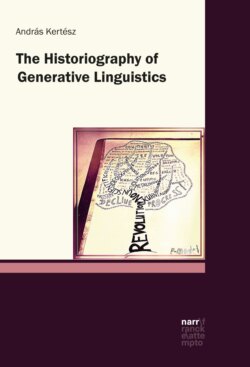Читать книгу The Historiography of Generative Linguistics - András Kertész - Страница 6
На сайте Литреса книга снята с продажи.
1 Introduction 1.1 The problem (P)
ОглавлениеJohn E. JosephJoseph, John E. (1995) describes linguists in his seminal review article entitled The Structure of Linguistic Revolutions – the title of which alludes to Thomas S. KuhnKuhn, Thomas S.’s famous book – in the following way:
Rare is the linguist who does not consider himself part of a linguistic revolutionrevolutionlinguistic accomplished in recent memory, or in progressprogress, or both. […] Revolution […] is the master plot for linguistic historyhistory, what gives sense to our work and careers, what makes it worth getting out of bed in the morning (JosephJoseph, John E. 1995: 379; emphasis added).
He characterizes the Department of Linguistics and Philosophy at the Massachusetts Institute of Technology as follows:
The department is unique in having fostered over the last forty years not one, but easily a dozen large-scale or small-scale linguistic revolutionrevolutionlinguistics. Most of them have been revolutions against earlier revolutions spawned there as well. More amazingly still, many of them have been led by the same man, revolting against his own program of a few years before: Noam ChomskyChomsky, Noam, Serial Revolutionary (JosephJoseph, John E. 1995: 380; emphasis added).1
Noam ChomskyChomsky, Noam is not the only outstanding staff member of the above mentioned department: another was Thomas S. KuhnKuhn, Thomas S. (1922–1996), author of The Structure of Scientific Revolutions, who brought about a fundamental change concerning previous ideas about the development of science, and who – like Chomsky himself – became one of the most quoted, the most frequently praised, and at the same time the most harshly criticized authors of the twentieth century. While according to JosephJoseph, John E. (1995: 380), there was no professional cooperation documented between Chomsky and Kuhn, their works are linked in a peculiar way by the term ›scientificscientific revolutionrevolutionscientific‹. Kuhn proposed an approach to the historiographyhistoriography of science the fundamental idea of which is that the development of the natural sciencesciencenaturals is not of a cumulative nature, but, rather, is made up of paradigmparadigm shifts that are the results of crises and revolutions questioning the previous scientific worldview (Kuhn 1962 [1970]). Against the background of these ideas, Chomsky’s activity has been termed ›Chomsky’s revolution‹.
Nevertheless, the association of the term ›revolution‹ with the historyhistory of generative linguistics raised heated debates. Some of the historiographicalhistoriography approaches to generative linguistics do not doubt the thesis claiming its revolutionaryrevolutionary nature, along with the applicability of KuhnKuhn, Thomas S.’s framework to the history of linguistics. Others reject this term, this thesis and this framework, and use significantly different labels, ranging from ›revolution‹ in a non-KuhnianKuhnian sense through, for example, ›evolutionevolution‹, ›coupcoup‹, ›erosionerosion‹, ›spurious sciencesciencespurious‹ to ›unscientific revolutionrevolutionunscientific‹. Thus, the history of generative linguistics poses a challenge for the historiography of linguistics. It poses a challenge because, first, the historiography of generative linguistics, similarly to that of all sciences, needs to find a framework – including its central hypothesis and its basic terms – which might be used to investigate its object of investigation, namely, the description of the rise, the internal development and the significance of generative linguistics, as well as its relation to other linguistic trends.
Second, the heated debates mentioned above, and the, at times, radical approaches to the topic, make this task a very difficult enterprise primarily because the literature is considered to be extremely biasedbias in nature.
In order to meet this challenge in the present book, we will raise the main problem of the historiographyhistoriography of generative linguistics as follows:
| (P) | What historiographicalhistoriography framework, central hypothesis and basic terms can account for the historyhistory of generative linguistics? |
